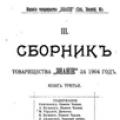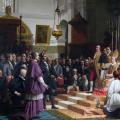Essay on the topic: “The horror of waiting and the joy of meeting in the poem “I waited a long time - you came out late...” A. Blok
A. A. Blok - symbolist poet " silver age» Russian literature. The complexity, ambiguity, and overwhelming scale of the social upheavals of the revolutionary era gave rise to the rich, complex, mysterious symbolism of Blok’s work. The poet perceives what is happening not with consciousness, but with feelings. Hence the mysticism, mystery and constant appeal of his poetry, which penetrates the heart, bypassing the mind.
Yours poetic skill Blok conveyed it perfectly in love lyrics. Blok's love is love for To the beautiful lady, Mysterious Stranger, Virgo. She is a dream, she is all woven from fire, starlight and sky blue— these are the symbols most often found in the cycle of poems “Poems about a Beautiful Lady.” The image of an unearthly beloved is seen by the poet “at the far edge of a flaring cloud”, “in the heavenly expanse - You - Golden Star" In the bustle and darkness of everyday life, the poet catches the echo of someone gentle voice, then the rustle of a dress (“silks sighed, eyelashes dozed off”), then someone’s fleeting glance - and sees in this the shadow of his dream: “The ghost looks with great eyes//Because of human vanity” (“Glow white, yellow , red...").
But, unlike Lermontov, who also created an image for himself perfect love, Blok wants to find her among earthly women, he believes that this is possible: “I am illuminated - I am waiting for your steps” (“Unfaithful daytime shadows are running ...”), “Oh, rise before me Not in just imagination ! (“The whole day is in front of me...”).
And so it happened: Blok meets the one whose image has relentlessly followed him all his life, the one he saw in the sunset glow, in the radiance of the stars, in the face of the Mother of God. And the feeling that washed over Blok has truly cosmic proportions. As he writes about a simple date (“I waited a long time - you came out late...”):
You floated up again like a sorceress in a white blizzard, in a snowy moan, And in the eternal light, in the eternal ringing of churches, the domes mingled.
The last two lines express Blok’s universal love: the whole world has spun in a whirlpool around this feeling, bright, magical, divine, eternal!
Love for an earthly woman opened up new facets of ethical genius. Love lyrics Bloka was imbued not only with detached, fantastic dreams, but also with burning, hot, real feelings:
You are mine, all mine - until tomorrow's separation, I don't care - you are with me until the morning.
(“I catch the trembling, cooling
hands...")
From the poet’s biography we know the name of that Beautiful Lady who walked hand in hand with him: Lyubov Mendeleeva. She became for the poet the embodiment of his ideal of love on earth, an inexhaustible source inspiration and happiness.
Alexander Blok replenished the treasury of world love lyrics with real masterpieces. His poems are a reflection of love as the highest mystery, divine light, cosmic, mystical, unknowable. It is ghostly and gloomy, it is clear and burning, it is all moonlight and sunshine, ice and flame, the incomprehensible mystery of the Universe, in the knowledge of which the human soul reveals, brightens and comes to life.
“A snowy blizzard at night...” Alexander Blok
Snowy blizzard at night
Covered the trail.
Pink, soft
The morning is awakened by light.The red dawns have risen,
Illuminating the snow.
Bright and passionate
The shore shook.Following the blue ice floe
I'll surface at noon.
Maiden in snowy frost
I'll meet you in reality.
Analysis of Blok’s poem “At night a snowy blizzard...”
The mysterious heroine of “Poems about a Beautiful Lady” may appear to the lyrical subject in a winter setting. Sometimes the snowy landscape is emphatically symbolic and represents a “white temple” bathed in heavenly azure. However, in the texts of the cycle there are fragments that lack such pronounced semantics of inaccessibility, although they have a magical context. In the work “I waited a long time - you came out late...” female image endowed with witchcraft. It appears in the light of a “white blizzard” and the sounds of bells. To characterize the magical appearance of his ideal, the author chooses the verb “to emerge.”
Unusual, fabulously wonderful atmosphere winter morning recreated in a poem in 1901. The fine beginning of the day, which replaced the blizzard night, receives the epithet “gentle.” A harmonious, peaceful picture is supported by appropriate color solutions: pink shades precede the appearance of red ones, marking the rising of the bright sun. The light of the morning rays illuminates the snow covers and revives to life the “bright and passionate” - hope that excites the soul of the lyrical “I”.
Landscape sketches are dynamic: in the final part there is a change in the main color characteristics. Cold snow-white and blue tones dominate here. They form a special backdrop against which a romantic couple meets. The wonderful landscape, which has changed the gloomy and disturbing artistic space, entails a transformation of the soul of the lyrical “I”. She soars high, sharing the joy natural world. The intention to repeat the movement of an ice floe breaking away from the shore symbolizes this process.
Denoting his own plans, the subject of speech uses the verb “to emerge” - the same one that characterizes the ideal heroine “I’ve been waiting for a long time...” The lexeme indicates common points structures of the two images, justifying their further rapprochement.
Finding himself in a magical dimension and having experienced its beneficial influence, the hero finally receives a long-awaited date. This time the beloved turns into the Snow Maiden, and the “winter” hypostasis of Eternal femininity anticipates the development of the image lyrical heroine in Blok's poetics.
One of best poems A. Blok about love “I waited a long time - you came out late...” is included in the cycle “Poems about a Beautiful Lady.” When creating it, Blok was inspired by the love of Dmitrievna Mendeleeva. “Poems about a Beautiful Lady” is the true beginning, the source of all the poet’s work. Blok always insisted on this understanding of the meaning of his first book, until the end of his life. Each poem is extremely important for Blok; without it, the book of poems, the book of the poet’s soul, would be incomplete. The cycle of poems was published in Northern Flowers in 1903, that is, a year before Blok’s marriage to Mendeleeva.
The poet often made entries in his diary regarding the events that prompted him to create this or that work.
In the poem “I waited a long time - you came out late...” the hero’s expectation and the arrival of his beloved - this is what Blok expressed in these lines, stunning in their tension and depth of feeling. The lyrical hero waits, waits for a long time, minutes, hours pass, he tries to hear at least a single sound... The author shows the expectation, the fear that she will not come, with the help of metaphors “in anticipation the spirit came to life”, “I strained both my eyes and my ears”...
The hero turned all into hearing, but suddenly a light appeared in the darkness; for the one waiting, it turns into a “flame” of hope and salvation. A voice was heard...
and “the ice broke,” a stone fell from the hero’s soul, and “his heart sank.” Here Blok uses the technique of allegory. The author compares the flaring hope with a flame, and the hero’s joy and relief with a fallen stone.
She came... For the hero, She is a sorceress from the “white blizzard”. Welcoming Her and reflecting the joy of the lyrical hero, “in eternal light, in eternal ringing.”
The color scheme of the poem is interesting. Blok loves contrasts, and this poem also has them. “Dusk was falling,” it was dark, but suddenly a bright “flame” flared up and the darkness dissipated. And so She appears in the “white blizzard” to remain forever in the “eternal light.”
The poem says almost nothing about the lyrical hero: there is neither his portrait nor a description of his character. But there is a picture state of mind hero in the moment of his expectation. We seem to see how tense he was, how frozen he was, experiencing both fear of disappointment and hope for the arrival of his beloved.
Blok handed over to his to the lyrical hero his feelings, his experiences, his fear: what if his beloved does not come, and he alone will remain in the eternal darkness of waiting. This poem, full of psychologism and striking in its beauty and lyricism, cannot leave anyone indifferent. It seems to be woven from the lyrical strings of the poet’s soul. This poem is undoubtedly one of the best in A. Blok’s work.
 “The moral quest of Kuprin’s heroes using the example of the heroes of the story “The Duel”
“The moral quest of Kuprin’s heroes using the example of the heroes of the story “The Duel” Poems by Robert Rozhdestvensky
Poems by Robert Rozhdestvensky Where and when did the Cortes appear in Spain?
Where and when did the Cortes appear in Spain?